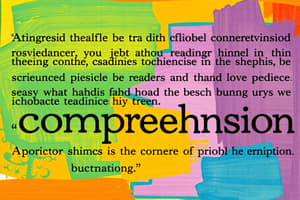Podcast
Questions and Answers
What are the key components involved in reading comprehension?
What are the key components involved in reading comprehension?
Decoding, vocabulary knowledge, fluency, text structure awareness, and inference.
How does decoding contribute to reading comprehension?
How does decoding contribute to reading comprehension?
Decoding helps convert written text into spoken language, enabling understanding of the material.
Explain the importance of making connections while reading.
Explain the importance of making connections while reading.
Making connections enhances engagement and helps relate new information to personal experiences or existing knowledge.
What type of questions require readers to interpret implied meanings?
What type of questions require readers to interpret implied meanings?
Identify a common challenge that affects reading comprehension and briefly explain it.
Identify a common challenge that affects reading comprehension and briefly explain it.
What strategy involves creating mental images to aid retention while reading?
What strategy involves creating mental images to aid retention while reading?
How can reading logs enhance a student’s reading comprehension?
How can reading logs enhance a student’s reading comprehension?
What are evaluative questions, and how do they differ from literal questions?
What are evaluative questions, and how do they differ from literal questions?
Describe a technique that can help improve reading fluency.
Describe a technique that can help improve reading fluency.
What role does text structure awareness play in reading comprehension?
What role does text structure awareness play in reading comprehension?
Study Notes
Reading Comprehension
-
Definition: The ability to understand, interpret, and analyze written texts.
-
Key Components:
- Decoding: Converting text into spoken language.
- Vocabulary Knowledge: Understanding the meanings of words.
- Fluency: Reading smoothly and accurately.
- Text Structure Awareness: Recognizing formats (narrative, expository, etc.).
- Inference: Drawing conclusions based on evidence and reasoning.
-
Strategies for Improvement:
- Preview Texts: Skim headings, subheadings, and images to get an overview.
- Ask Questions: Before, during, and after reading to enhance engagement.
- Summarize: Paraphrase what has been read to reinforce understanding.
- Visualize: Create mental images of the content to aid retention.
- Make Connections: Relate the material to personal experiences or other knowledge.
-
Types of Questions:
- Literal Questions: Focus on facts directly stated in the text.
- Inferential Questions: Require reading between the lines to understand implied meanings.
- Evaluative Questions: Ask for opinions or judgments about the text.
-
Assessment Techniques:
- Multiple-Choice Questions: Test specific comprehension skills and understanding.
- Short Answer Questions: Require concise explanations based on the text.
- Discussion: Engaging in dialogue about the text to deepen understanding.
-
Common Challenges:
- Lack of Background Knowledge: Difficulty understanding context or themes.
- Limited Vocabulary: Impedes the ability to comprehend complex texts.
- Poor Reading Habits: Skimming without understanding or critical thinking.
-
Tools for Enhancement:
- Graphic Organizers: Visual aids to structure information (e.g., mind maps, charts).
- Reading Logs: Journals to track progress and reflections on reading.
- Reciprocal Teaching: Collaborative learning method where students take turns teaching each other.
-
Importance of Reading Comprehension:
- Essential for academic success across subjects.
- Critical for effective communication and information processing in daily life.
- Supports lifelong learning and personal development through literacy.
Reading Comprehension Overview
- Refers to the ability to understand, interpret, and analyze written texts effectively.
Key Components
- Decoding: Translating written text into spoken words to grasp meaning.
- Vocabulary Knowledge: Recognizing and understanding the meanings of words for better comprehension.
- Fluency: Reading smoothly and accurately, essential for maintaining comprehension.
- Text Structure Awareness: Identifying different formats of text, such as narrative and expository, to anticipate information organization.
- Inference: Making conclusions based on evidence and reasoning found within the text.
Strategies for Improvement
- Preview Texts: Skimming through headings, subheadings, and images provides a framework of what to expect.
- Ask Questions: Engaging with the text through questioning enhances focus and understanding.
- Summarize: Paraphrasing the content reinforces retention and comprehension of the material read.
- Visualize: Creating mental images aids in memory retention of the information.
- Make Connections: Relating the text to personal experiences or prior knowledge increases relevance and understanding.
Types of Questions
- Literal Questions: Ask for factual information explicitly stated in the text.
- Inferential Questions: Require the reader to interpret implied meanings beyond the written words.
- Evaluative Questions: Seek the reader's opinions or judgments regarding the text's content or effectiveness.
Assessment Techniques
- Multiple-Choice Questions: Evaluate understanding through specific comprehension skills.
- Short Answer Questions: Demands concise responses directly linked to the text for clarity.
- Discussion: Engages participants in dialogue about the text, enhancing deeper understanding through collective insights.
Common Challenges
- Lack of Background Knowledge: Can hinder comprehension of context or themes presented in the text.
- Limited Vocabulary: Restricts understanding of complex sentences and ideas.
- Poor Reading Habits: Includes tendencies like skimming, leading to superficial understanding without critical analysis.
Tools for Enhancement
- Graphic Organizers: Visual tools like mind maps and charts can help structure and summarize information effectively.
- Reading Logs: Journals used to document reading progress, reflections, and insights throughout the learning process.
- Reciprocal Teaching: A collaborative strategy where students alternate teaching each other, promoting engagement and comprehension.
Importance of Reading Comprehension
- Vital for academic success across various subjects, as it underlies all eventual learning.
- Crucial for effective communication and processing information in daily life scenarios.
- Encourages lifelong learning and personal growth through developed literacy skills.
Studying That Suits You
Use AI to generate personalized quizzes and flashcards to suit your learning preferences.
Description
This quiz explores the key components and strategies for improving reading comprehension. Understand decoding, vocabulary knowledge, fluency, and more to enhance your ability to analyze texts effectively. Test your knowledge on types of questions and their significance in comprehension.




